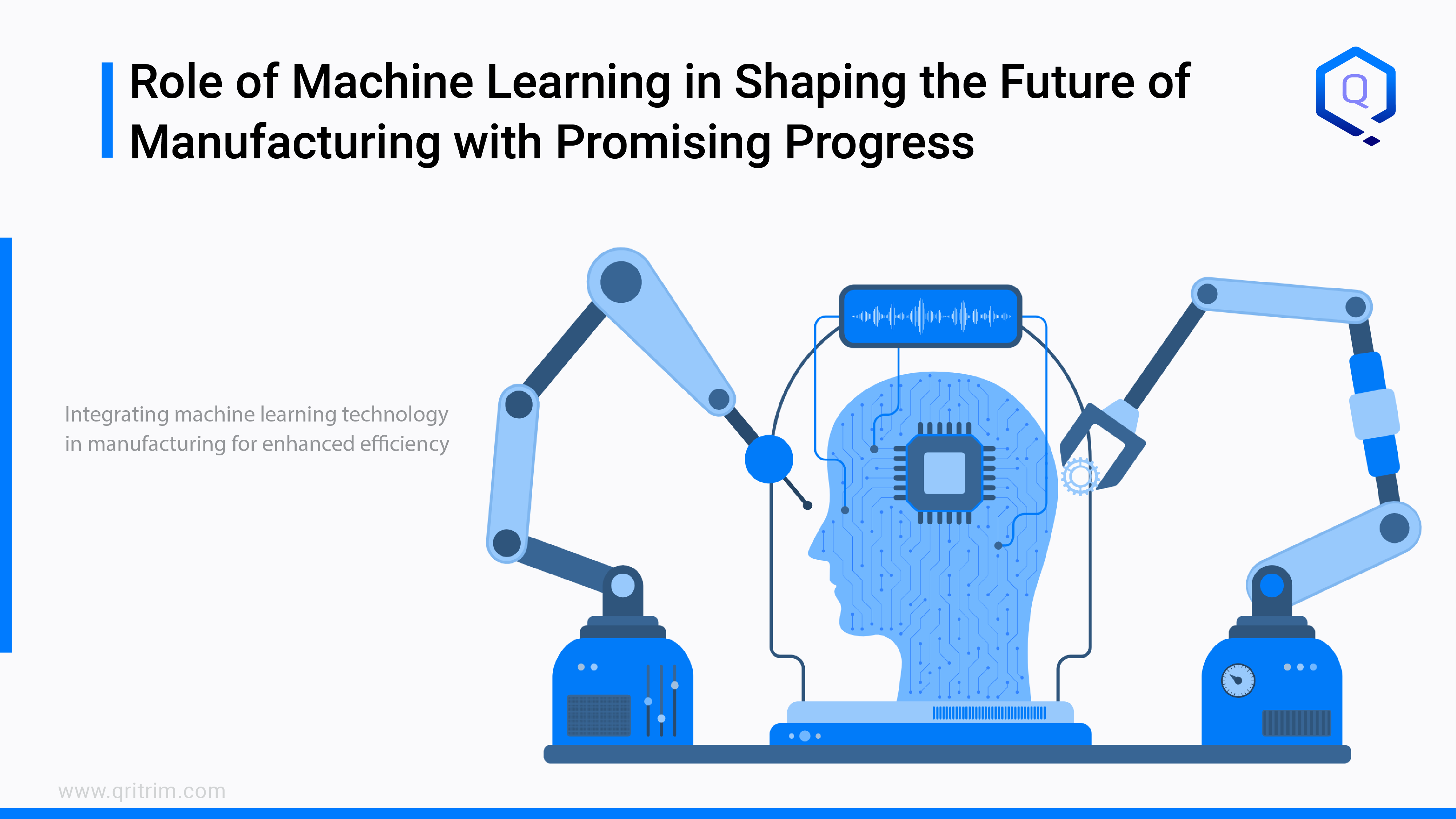Sustainable, agile, and competitive manufacturing futures, where machines and minds harmonize in a symphony of progress.
The pathway to smarter, more agile, and sustainable manufacturing practices, propelling businesses into a competitive future is to embrace Machine learning technology.
Machine learning refers to the use of algorithms and data analysis. It makes machines work smarter. Efficiently cuts costs, and ensures better quality products. Helps complete work smarter, not harder.
In this blog let us explore how machine learning is transforming manufacturing by improving efficiency, reducing costs, and ensuring high quality products.
Comprehending Machine Learning in Manufacturing:
Machine learning in manufacturing is like teaching a computer to think and make decisions based on data patterns. Let’s take a quick look at the different types of machine learning that are useful.
Supervised learning
Teaching a computer by taking examples is what it does. For example, show pictures of good and bad products that it learns to distinguish between them.
Unsupervised learning
This is where the computer looks for patterns on its own without being taught. It can find hidden insights in data that might otherwise go unnoticed.
Reinforcement Learning
Again this is like teaching a computer through trial and error. It learns by trying different things and seeing what works best.
How does this help in Manufacturing?
To simply put in manufacturing, Machine learning is like having a smart helper. It keeps machines running smoothly in a factory. Efficiently produces top-notch quality products. It is like having a team of experts working around the clock. Changing the processes of how we make things using machines.
In the next section let’s discuss the applications of machine learning in manufacturing in detail.
Applications of Machine Learning in Manufacturing
Automating Processes
Learning from past data to optimize processes, machine learning makes processes faster and more efficient. It takes over repetitive tasks. Frees up humans for more important work. This can be anything from sorting products on a conveyor belt to fine-tuning machine settings for maximum performance. It is like a tireless worker who does not tire or make mistakes.
Optimizing Supply Chain
All I can say is for any manufacturer incorporating machine learning technology is like having a crystal ball for inventory. Based on past data, it predicts demand. Helps factories stock just the right amount of materials while optimizing logistics by finding the fastest and most cost-effective shipping routes. This way products are available when needed. Improves delivery times and reduces storage.
Quality Assurance
Machine learning is like having a super-sleuth that can spot defects in products. It looks at product data in real-time. Analyzing things like shape, color, and size. Sees if something is wrong and it raises an alarm, ensuring that only top-quality products make it to the customers. This not only saves money on waste but also keeps customers happy with consistent quality.
Predictive Maintenance
Predictive maintenance is like a crystal ball for machinery. Machine learning examines machine data such as temperature, vibration and usage patterns. By analyzing this data, it can predict when the machine might experience problems in the future. This helps factories fix things before they break, saving time and money on expensive repairs and unplanned downtime where you are letting machines take care of themselves.
Challenges to be taken into consideration in Machine Learning for Manufacturing:
Data Quality and Availability
Key challenges in leveraging machine learning in manufacturing are ensuring the quality and availability of data:
- The data format should be compatible with machine learning algorithms. To make it suitable for analysis cleaning and preprocessing data is a time-consuming process.
- High-quality data is what algorithms rely on heavily. For obtaining reliable insights and predictions, ensuring that data is accurate, complete, and free from errors or biases is crucial.
- Availability of relevant data can be a challenge, especially in cases where historical data may be limited or incomplete. Access to real-time data from sensors and other sources is essential for effective ML applications.
Integration with Existing Systems
When integrating ML with existing manufacturing systems poses several challenges:
- It is complex to ensure compatibility between machine learning models existing software systems databases, and hardware infrastructure.
- Data analysis requires careful planning and implementation when integrating data from diverse sources and systems into a unified platform.
- With production systems, control systems, and other operational technologies without disrupting workflows or causing downtime, Machine learning systems need to seamlessly integrated
Required Skills and Training
For a successful implementation of machine learning in manufacturing requires skilled personnel and comprehensive training programs:
- There is a growing demand for data scientists, machine learning engineers, and AI specialists with expertise in manufacturing domain knowledge. Finding and retaining skilled talent can be a challenge.
- Training the existing workforce on machine learning concepts, tools, and techniques is essential for effectively leveraging machine learning in manufacturing. This includes understanding data analytics, model development, and deployment.
- Between data scientists, engineers, and operational teams encouraging collaboration is crucial for aligning machine learning initiatives with business objectives and operational requirements.
For innovation in machine learning in manufacturing, one needs commitment to continuous improvement. Addressing these challenges requires a multi-faceted approach, including investment in data management tools and infrastructure, ongoing training and development programs, and cross-functional teamwork.
Benefits of Machine Learning in Manufacturing:
Efficiency Improvement
Machine learning brings a wave of efficiency improvements to manufacturing operations:
- Streamlines operations by identifying inefficiencies in processes and suggests improvements for smoother workflows.
- Downtime is reduced by predicting equipment failures before they occur avoiding unplanned downtime. Keeps production lines running smoothly and minimizes disruptions.
- Production efficiency improves through process optimization and automation reducing bottlenecks, and maximizing production output.
Reduced Cost
ML is consequential across various areas of manufacturing when it comes to cost-saving:
- Possessing capabilities like emergency repairs minimization, extending machinery lifespan, and predictive maintenance that address equipment issues, ML reduces maintenance costs.
- Machine learning’s demand forecasting capabilities optimize inventory levels, reducing excess stock and minimizing storage costs. Optimizes logistics, reducing transportation costs and improving delivery efficiency.
- Capabilities like real-time defect detection reduce waste by identifying and addressing quality issues early in the production process, saving on materials and rework costs.
Enhanced Product Quality
ML ensures top-notch product quality plays a pivotal role:
- Machine learning optimizes manufacturing processes, fine-tuning parameters for optimal quality outcomes and minimizing errors.
- Through real-time monitoring and analysis, machine learning detects defects and anomalies with precision. Ensuring that only high-quality products reach customers.
- By enforcing quality standards and compliance measures ML maintains consistent product quality and regulatory adherence.
Increasing efficiency, substantial cost savings, and consistently enhanced product quality, machine learning empowers manufacturers to stay competitive in the industry landscape.
Future Trends in Machine Learning and Manufacturing:
Increased Automation
- Robotic automation, intelligent assembly lines, and autonomous vehicles, all such AI-driven processes, are transforming traditional manufacturing operations. This trend is leading to increased productivity, reduced errors, and faster production cycles.
- Capable of handling complex tasks, and making autonomous decisions automation in manufacturing is on the rise. AI/ML is driving these advancements while making machines smarter.
Real-Time Decision Making
- Vast amounts of data analysis in real-time, AI/ML provides actionable insights and predictions.
- Optimizing workflows, responding swiftly to changing market demands, real-time decision-making improves operational efficiency and avoids bottlenecks. ML enhances agility, responsiveness, and decision accuracy across all levels of the manufacturing process.
Energy Efficiency and Sustainability
- Predictive analytics and optimization algorithms optimize energy-intensive processes, reduce waste, and lower carbon footprints. Machine learning enables manufacturers to meet sustainability goals, comply with regulations, and contribute to environmental stewardship.
- AI-powered systems analyze energy consumption patterns. Optimize resource utilization and identify opportunities for energy savings.
Predictive Maintenance Advancements
- Algorithms analyze equipment data. Predict potential failures before they occur. Detect anomalies.
- Machine learning models learn from historical data to forecast maintenance needs accurately. Optimizes maintenance schedules. Minimize downtime. This proactive approach leads to significant cost savings, increased equipment reliability, and improved asset performance.
These future trends in machine learning and manufacturing represent a paradigm shift towards smarter, more efficient, and sustainable manufacturing practices.
Embracing these trends requires investments in AI technologies, data analytics capabilities, and a strategic focus on innovation and continuous improvement.
Equip for the Future in Machine Learning and Manufacturing:
Training and Skill Development
- Leveraging machine learning effectively, establish comprehensive training programs to equip employees with the necessary skills.
- Train teams on domain-specific knowledge in manufacturing processes. Offer training in data analytics. Machine learning algorithms. Programming languages (such as Python and R).
- Encourage continuous learning and upskilling through workshops, online courses, and certification programs.
- Foster a culture of curiosity, experimentation, and innovation to empower employees to explore new technologies and solutions.
Infrastructure Upgrades
- Invest in upgrading infrastructure to support machine learning applications, including data storage, computing power, and network capabilities.
- Implement scalable and flexible cloud-based solutions for data processing, model training, and deployment.
- Deploy edge computing technologies for real-time data processing and analysis at the point of production.
- Ensure robust connectivity and data integration across systems for seamless interaction between machine learning models and manufacturing processes.
Collaboration with AI Experts
- Data scientists should collaborate with AI experts, and consultants to leverage their expertise in developing and implementing machine learning solutions.
- Partner with technology providers and research institutions for access to cutting-edge tools, algorithms, and best practices in machine learning.
- Foster cross-functional collaboration between data science teams, IT departments, and operational teams to align machine learning initiatives with business objectives and operational requirements.
- Leverage external resources and expertise for training, mentoring, and guidance in machine learning implementation and optimization.
Data Management and Security
- Establish robust data management practices. This ensures the accuracy, reliability, and security of data used in machine learning.
- Implement data governance policies, data quality checks, and data validation processes to maintain data integrity.
- Adhere to data privacy regulations. Industry standards. This helps handling of sensitive information.
- Protect data from unauthorized access and cyber threats. For this you need to invest in cybersecurity measures, such as encryption, access controls, and threat detection systems.
Staying Informed
- Stay abreast of the latest developments, trends, and innovations in machine learning and AI through industry conferences, webinars, and publications.
- Networking within the organization to exchange ideas helps encourage knowledge sharing and exchange ideas, to learn more best practices in machine learning adoption.
- Fostering a culture of continuous learning and curiosity to adapt to evolving technologies and stay competitive in the dynamic manufacturing landscape.
For future growth, efficiency, and innovation address these aspects of preparation proactively. By doing so, manufacturing organizations can position themselves for success in harnessing the transformative potential of machine learning.
Final Say
Embracing machine learning unlocks efficiency, cost savings, and quality improvements offering a competitive edge and sustainable manufacturing practices.
Defect detection, predictive maintenance, supply chain optimization, and automation lead to reduced downtime, enhanced efficiency, and streamlined operations. Cost savings arise from optimized maintenance, inventory, and waste reduction, while improved quality arises from early defect detection and process optimization.
Future trends like increased automation, real-time decision-making, predictive maintenance, and energy efficiency shape manufacturing’s future, demanding investments in skills, infrastructure, data management, AI collaboration, and staying updated.
While there are challenges including data quality, integration complexities, and skill requirements, with a strategic ML implementation one can see continuous improvement and innovation in processes for manufacturing.
Qritrim’s revolutionary Artificial Intelligence (ADI) solutions, infused with advanced AI and machine learning capabilities, are poised to transform the manufacturing environment by providing customized AI models tailored to specific industry challenges. Qritrim’s Qi platform enables manufacturers to optimize manufacturing processes, predict maintenance needs, improve product quality and simplify supply chains because it emphasizes deep domain knowledge and real-time data processing. By leveraging Qritrim’s AI solutions, manufacturers can unlock opportunities for efficiency improvements, cost savings and continuous innovation, placing them at the forefront of Industry 4.0 development and ensuring sustainability and competitiveness in the rapidly evolving manufacturing sector.




























